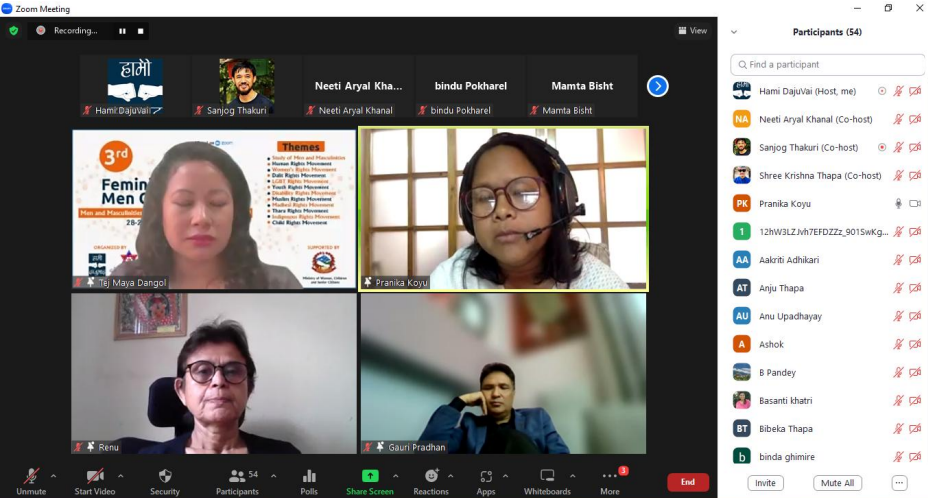Feminism and Men Conference

Feminism and Men Conference is one of the HDV’s pioneering initiatives. Nepal’s first Feminism and Men Conference was organized by Nepal's human rights organisations including Hami DajuVai on 2020, which engaged nearly 40,000 people (including through social networks) on 12 conceptual and thematic panel discussions led by 34 experts discourse on history, concept and theory of pro-feminist movement; arenas of GBV and search for scope of Men Engagement; opportunities for young men to acknowledge their privileges and understand how it infiltrates on issues of social justice including gender; the fundamentals of MenEngage approach in Nepal and provide a constructive way forward model through collective learning and knowledge strengthening; and Men Engagement movement's accountability towards larger feminist movement. It aims to discuss issues of men's participation in Nepal's feminist movement, how it is perceived, how it should be looked at, how to address toxic masculinity, and to analyse men's accountability and commitment for substantive equality and justice. The conference took to virtual participation through the Zoom application due to restrictions on face-to-face gatherings owing to the COVID-19 pandemic.
Following similar objective, HDV further organized the second Feminism and Men Conference in 2021 in collaboration with the Department of Gender Studies, Tribhuvan University, with support from the European Union Delegation in Nepal. The second conference succeeded in highlighting practical approaches of men’s involvement in advancing the feminist movement in Nepal.
Moreover, in 2023, Hami DajuVai, in collaboration with Tribhuvan University’s Gender Studies Department, with the support of the Ministry of Women, Children, and Senior Citizens, as well as the Lalitpur Metropolitan City, conductedthe third Feminism and Men Conference. It aimed to explore men's engagement in gender justice and the role of masculinity in creating a more equal society. Various panel discussions, interactive dialogues, and presentations covered diverse thematic areas, making the conference highly engaging and inclusive. The sessions focused on human rights, youth rights, disability rights, and the education sector, exploring how masculinity shapes these areas, child rights, friendship rights, LGBTQ+ rights, and the impact of masculinity in daily life and sexual relationships, Dalit rights, women's rights, Muslim rights, and indigenous and ethnic rights. The conference also focused on research and studies related to the impact of masculinity and men in various human rights movements and sectors across Nepal. Scholars presented findings from 12 different movements and thematic areas, providing valuable insights into gender dynamics.
